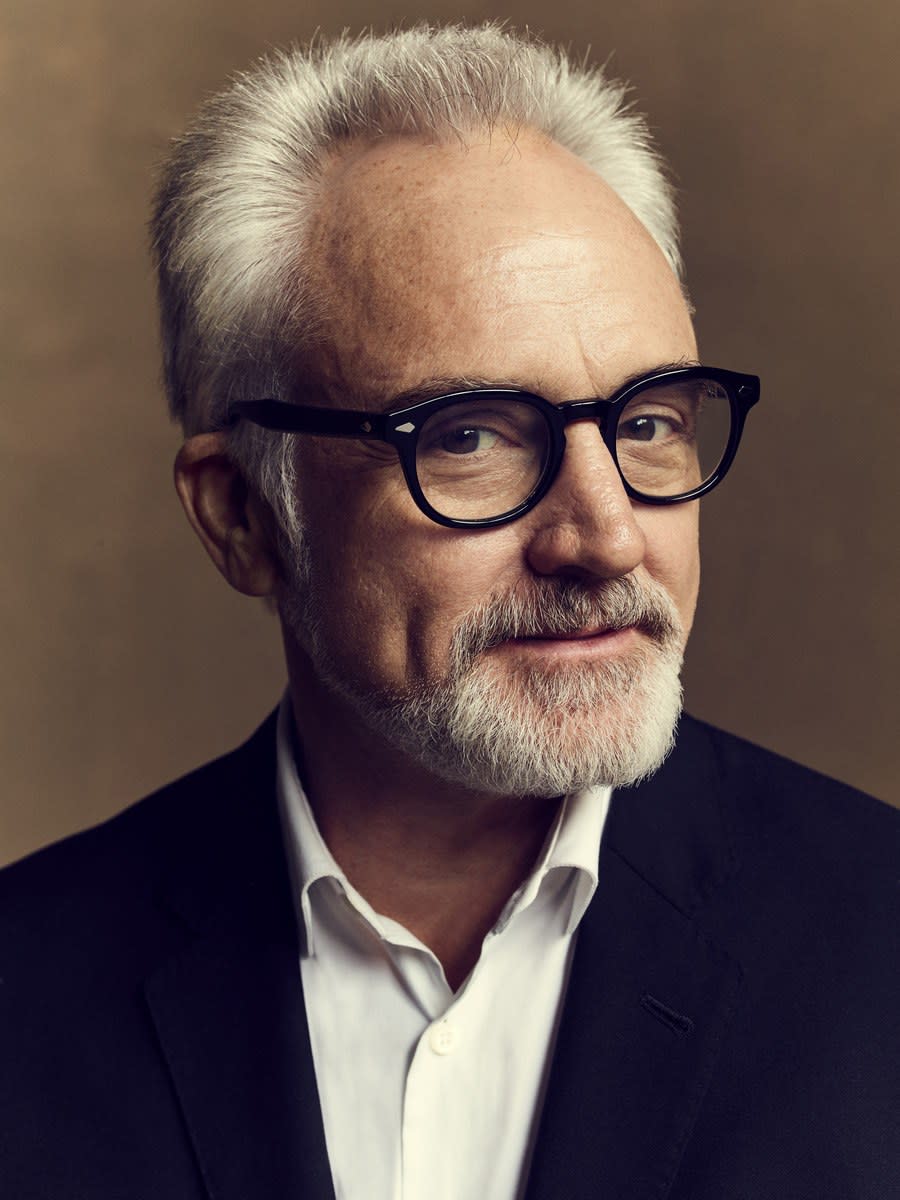Bradley Whitford Will Save Us From the Monsters
Is Bradley Whitford an accident? Some fluke of mad science? In this age, it can feel like it. Somehow, he has achieved the rare feat of becoming a successful, middle-aged white man in Hollywood that is also aware of his privilege, and the blind spots he might have. So it's funny—and reassuring—to see him admit to them. Like how, during the making of Get Out—Jordan Peele's runaway debut horror film about being black in America—he completely missed the point of one of the most iconic lines of the last five years, delivered by his character, Dr. Richard Armitage: "By the way, I would've voted for Obama a third time if I could."
"Yeah, what's really funny to me is—I worked on his campaigns. I love Obama," he says, after a laugh. He pauses for a moment. "I didn't even know that was a joke. I don't know, but I probably said it to Jordan, without realizing that it's the whitest thing a person could say."
That scene has become an iconic moment, one that sums up the irony of white liberalism in one witheringly funny scene. It's ironic, then, that Whitford's public persona has largely been informed by his seven years building most Americans' perception of liberalism looks like in the role of White House Chief of Staff Josh Lyman on The West Wing. From 1999 to 2006, Bradley Whitford embodied the (white) liberal ideal on one of the most popular and enduring shows of the 2000s, inadvertently making him—even if only by cultural osmosis—a figure of moral authority. Bolstered by his outspoken politics and a striking sense of self-awareness, Whitford has taken advantage of that persona to slip some deliciously ironic characters into his filmography, like the aforementioned Get Out villain, or DiFranco, the untouchable mobster who taunts—and gets his ass beaten by—Nicole Kidman in last year's Destroyer.
That's one of the most striking things about Whitford: He's got a knack for playing characters that understand their power and privilege, and aren't afraid to put them to use. For good or ill.

Whitford grew up Quaker, his early life split between Madison, Wisconsin, and southeastern Pennsylvania. Despite working in the industry since the '80s, Whitford's career was often described in the aughts as a late-blooming one, with The West Wing as his breakout role. ("It's probably the first line on the obituary," he tells me.) Being forever known as Josh Lyman is pretty good as far as calling cards go, and it's one not terribly removed from his personal philosophy. The actor frequently cites his Quaker upbringing as the root cause of his civic engagement, believing he would be politically active even if he didn't act for a living, and mentions his time on The West Wing as instrumental in his decision to remain vocal in public life.
"It can make you feel self-conscious because you get a lot of clapback when you start talking about politics. But politics isn't like a hobby, politics is the way you create your moral vision and democracies don't work, they don't just happen, you gotta make them happen every day. And I think now because we may have a Russian agent in the Oval, people realize that you gotta stay engaged."
Whitford doesn't seek out political roles ("If you go into a movie or a television show and your goal is to serve civic vegetables, you will fail. You will bore people"). He just seems to have an uncanny knack for portraying characters that strike a raw nerve in pop culture.
There's Get Out, of course, but there's also Joseph Lawrence in the most recent season of The Handmaid's Tale, or, more recently, Calvin Cooper, an entitled star with a history of bad behavior that needs covering up on the British drama Flack. It's possible, in fact, to read Whitford's career as a brief history of white men.
He played a lot of assholes—"yuppie scum," to use his words—like the jerk boyfriend in Adventures in Babysitting, or Al Pacino's bitter adult son in Scent of a Woman, or the villain in Billy Madison. Cocky men raised with a sense of ownership of the world around them, angry at anyone who would thwart them. While his filmography is too long and varied to universally characterize any one way, it does make Josh Lyman, his best-known role, his most ironic one—the one that later roles, like Steve Hadley in The Cabin in the Woods, or DiFranco in Destroyer, seem to wink at with their misanthropic turns.
"People will say to me, 'Wow you've made really good choices,'" he says. "And it always makes me laugh because just you don't know if it's going to work! Get Out, we had no idea that was going to work. I thought it was a brilliant script, but you know—people were not clamoring to be in that movie."

I ask him if he's ever felt the urge to disengage—being a well-meaning white guy in Hollywood right now is an easy way to make a lot of missteps and show off your blind spots. He responds with a story about basketball.
"A friend of mine knew the person who was running the NBA Legends brunch and I'm sort of a basketball fan. You get to go and be with Kareem Abdul-Jabbar and all these people. And NBA Commissioner Adam Silver, he's talking to a room full of professional basketball players. And I was stunned because he said, 'We don't want you to just play basketball. We want you to use the attention you're getting playing basketball to be a productive leader in the community.' I was stunned because a lot of people in Hollywood get a lot of shit for being politically active. I can tell you, we don't have our bosses coming down and saying get out there and be more political!"
That's the funny thing about Whitford's career: he hasn't been Josh Lyman for over a decade, yet he's only gotten more visibly political—he recently signed a letter alongside other actors pledging to not work in Georgia if the state's "fetal heartbeat" abortion bill passed, and used his TV legacy to support Presidential hopeful Mayor Pete Buttigieg. He repeats himself to me: "Politics is how you create your moral vision."
And moral visions of America are hard to come by. We're in a time that echoes what Whitford describes as the moment that really activated him politically, the American invasion of Iraq. "You feel like your own government is attacking your own children's future," Whitford says. " Which, unfortunately, is even worse now."
All the more reason to keep being engaged, to keep getting political. And for playing a few more white guys who are, hopefully, in on the joke.
Originally Appeared on GQ

